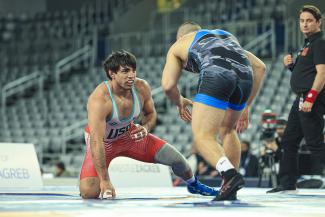World Combat Games Qualifiers: 12 Grappling Gi quotas confimed
Tuesday, May 2, 2023 - 12:50 By Vinay Siwach

TASHKENT, Uzbekistan (May 1) -- On the second day of the World Combat Games Qualifiers in Tashkent, Uzbekistan, 12 more quotas were awarded, following an entertaining day one.
Sixteen Grappling quotas were earned on Sunday, while Monday saw 12 Grappling Gi athletes book their tickets for the World Combat Games to be held in Riyadh, Saudi Arabia in October 2023.
The qualification process for the World Combat Games began in 2022 in Pontevedra, Spain, which also offered 40 quotas. The four highest-placed grapplers in each of the senior weight categories qualified for the World Combat Games in Saudi Arabia, scheduled for October 2023.
In Tashkent, the process is the same, and the first four highest-placed athletes in each weight category will qualify for one quota place for their national federation. However, if more than one athlete from the same country is ranked in the first four highest places in a weight category, only one quota will be allocated to the country. The remaining quota(s) will be reallocated in the same weight category to the national federation of the next best-ranked athlete who has not yet qualified.
With the deadline fast approaching, the national federations must confirm the usage of the quotas won by their grapplers to United World Wrestling at the earliest.
Men's Grappling Gi
71kg
Alessio SACCHETTI (ITA)
Feruzbek UROKOV (UZB)
Sandor LAKATOS (HUN)
Fierre AFAN (PHI)
100kg
Eldar RAFIGAEV (MDA)
Evgenii SLESARENKO (KGZ)
Azizbek SHARIPOV (UZB)
Guglielmo CECCA (ITA)
Women's Grappling Gi
53kg
Zhenishgul ABDYRAKHMAN KYZY (KGZ)
64kg
Zilolakhon MUHAMMADOVA (UZB)
71kg
Shynar UZBEKOVA (KAZ)
Bubusaira ABDILMANAP KYZY (KGZ)


Share your thoughts.
Comments